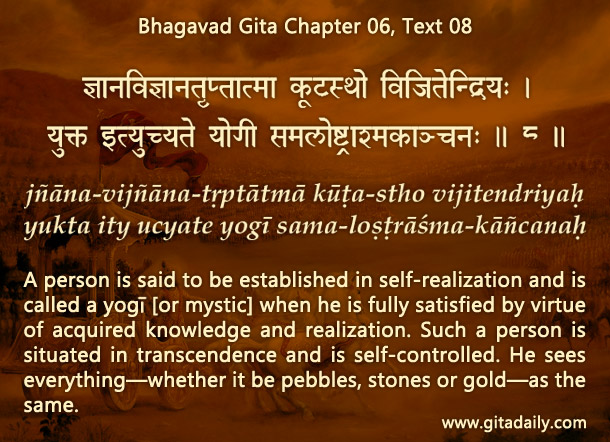Why applying what we know is so important – As is often said, knowledge is power. But where exactly does the power of knowledge lie? Not just in its informational content, but in its transformational capacity. Knowledge about electricity, mechanics or telecommunications is of little use unless applied to change how things work.
Knowledge needs to be applied to be a power — this principle holds true especially to spiritual knowledge. Such knowledge is meant to transform our desires and values from material accumulation to spiritual absorption in the all-attractive supreme reality, Krishna. The Bhagavad-gita (06.08) assures that such applied knowledge brings enrichment and contentment to the heart. And the Gita’s conclusion demonstrates how this knowledge empowered an initially demoralized Arjuna. By applying Gita wisdom, we too can become content and confident
But what happens when knowledge is not applied?
It impoverishes: Impoverishment is not necessarily a state of lacking money; it is more a state of having desires that are unfulfilled, maybe even unfulfillable. When we have knowledge that we don’t apply, then we get no inner contentment — and we start seeking pleasure in the praise we get for being so knowledgeable. Since such praise rarely comes in as much quantity and quality as we crave for, that paucity keeps us dissatisfied and eventually makes us feel impoverished
It burdens: Our ego, being inflated due to our knowledge, becomes a heavy load. It de-energizes us from doing anything with that knowledge if it won’t lead to us being praised. Over time, the effort necessary to maintain and increase that knowledge feels like a burden we have been sentenced to carry.
One-sentence summary:
Knowledge that is applied enriches and energizes; knowledge that is unapplied impoverishes and burdens.
Think it over:
- How does applied spiritual knowledge enrich and energize?
- How does applied spiritual knowledge impoverish and burden?
- When you learn something new, contemplate how it impacts you when you apply it and when you don’t.
***
06.08: A person is said to be established in self-realization and is called a yogī [or mystic] when he is fully satisfied by virtue of acquired knowledge and realization. Such a person is situated in transcendence and is self-controlled. He sees everything – whether it be pebbles, stones or gold – as the same.


Good point that knowledge needs to be applied to energise us